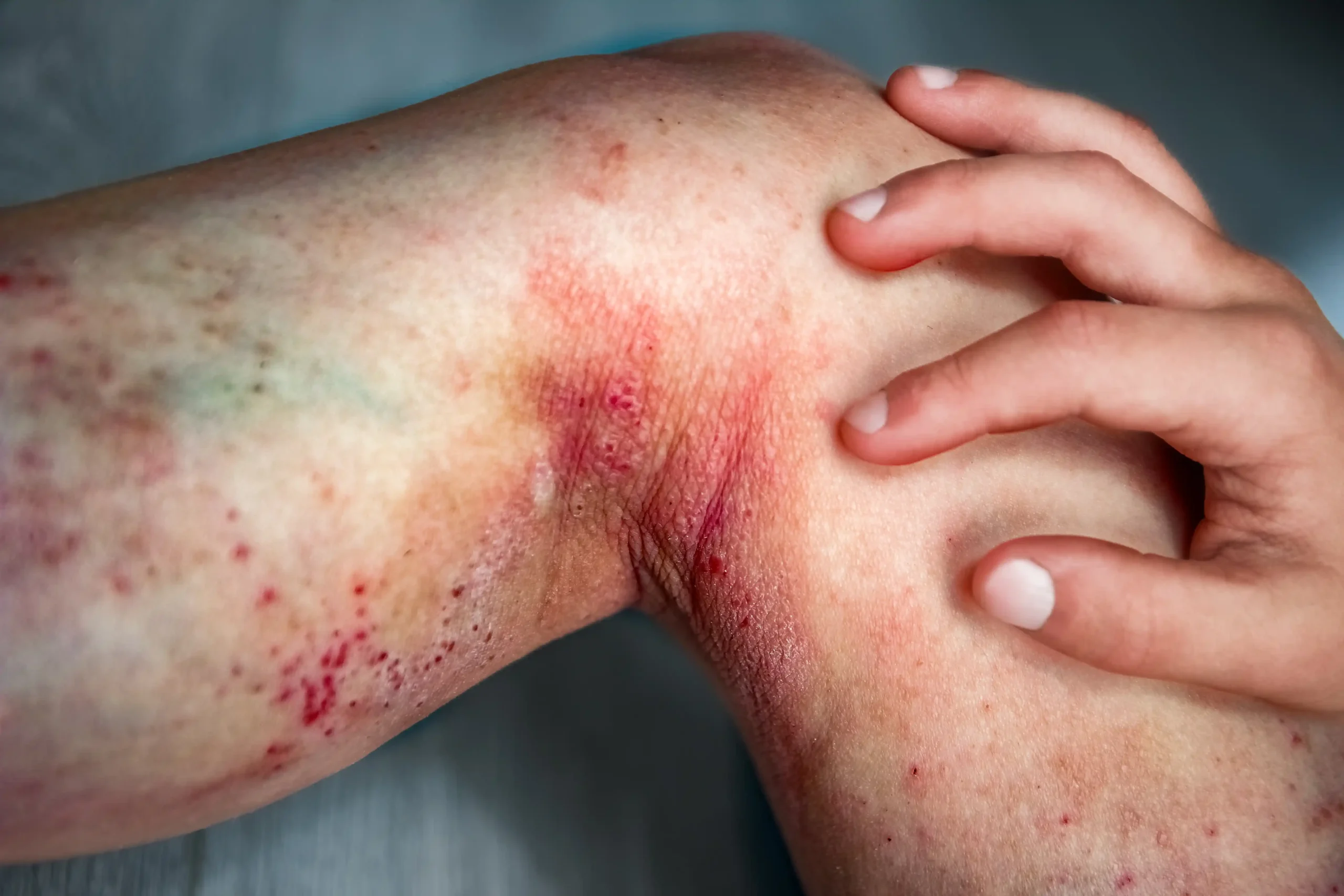Diet Therapy – what does treatment through diet involve and who can benefit from it?
Did you know that as early as ancient Greece, Hippocrates, the father of medicine, used to say: “Let food be thy medicine and medicine be thy food”? Even then, the impact of diet on health was recognised. Today, science confirms this – diet therapy, depending on the condition, can be a key element of treatment or significantly support therapy. But what exactly is treatment through diet? It is much more than just eliminating sugar and unhealthy fats or treating obesity! Diet therapy is used in a wide range of diseases – from metabolic disorders and intestinal conditions to supporting oncology treatments. Find out what diet therapy is and why it is worth incorporating into healthcare. And if you’re ready to take action – book a dietary consultation at Made By Diet® and see how nutrition can improve your health. You only have one body – take care of it!
Authors: MSc Eng. Klaudia Buczek, MSc Pharm. Michał Miśta
Table of Contents:
- What is Diet Therapy?
- Diet Therapy and Its Benefits – Why Change Your Eating Habits?
- Diet as prevention and support in disease treatment
- Optimising health through proper nutrition
- Diet therapy and improved quality of life for patients
- Which nutrients support diet therapy?
- Key macro- and micronutrients in dietary treatment
- The role of Fibre, antioxidants, and fatty acids in healthy nutrition
- Which Diseases Can Diet Therapy Help With?
- Diet therapy in chronic diseases – how nutrition supports treatment
- Diet therapy for gastrointestinal disorders
- Diet therapy in diabetes and metabolic disorders
- Cardiovascular diseases – the role of diet in prevention and treatment
- Food allergies and intolerances
- Autoimmune diseases – how can diet help?
- Diet therapy for metabolic and genetic disorders
- Diet therapy in cancer – how nutrition supports the body during oncology treatment
- Examples of Diet Therapy and Therapeutic Diets in Practice
- Dietary recommendations for cardiovascular diseases – what changes are beneficial?
- Elimination diets for allergies and intolerances – how to effectively avoid allergens?
- Gluten-free diet for coeliac disease – why is it the only effective treatment?
- Modifying basic diets in chronic diseases – key nutritional principles
- Diet in metabolic diseases – examples of effective nutritional interventions
- Nutritional support in oncology – diet therapy in cancer treatment
- Modern Diet Therapy – How Contemporary Approaches to Nutrition Support Treatment
- Impact on health – why diet can be as important as medication
- Diet as a support in treating peptic ulcer disease
- Gluten-free diet therapy – the only effective method for coeliac disease
- What are the current trends in diet therapy?
- Which diseases are treated with modern therapeutic diets?
- Personalised nutrition – the key to effective therapy
- What health benefits does diet therapy offer?
- How Can a Dietitian Help with Dietary Treatment?
- Conclusion – Why Consider Diet Therapy?
- References
1. What is Diet Therapy?
Diet therapy (also known as dietary treatment) is the intentional use of nutrition as a form of treatment or therapeutic support aimed at improving a patient’s health. It can serve as a key element of therapy — as in the case of diet-related diseases — or complement pharmacological treatment. Diet therapy, also referred to as nutritional therapy, is based on individually tailored dietary recommendations adapted to the patient’s health status, lifestyle, and needs. Its effectiveness has been scientifically proven, and its application includes both the treatment and prevention of many diseases.
Diet therapy as an effective form of treatment
Diet is not only a source of energy but also a key factor influencing health and the course of many medical conditions. A well-balanced diet can alleviate or eliminate symptoms, support the body’s regeneration, and improve the patient’s quality of life.
In practice, nutritional therapy is based on:
- Eliminating components that negatively affect health – such as gluten in coeliac disease, lactose in lactose intolerance, excessive simple sugars in insulin resistance, or reducing FODMAP-rich foods in irritable bowel syndrome (IBS).
- Enriching the diet with elements that support the body – for example, omega-3 fatty acids for heart diseases, antioxidants in cancer-preventive diets, or increasing protein intake in cases of sarcopenia and during recovery.
- Reducing inflammation – chronic inflammation is a key factor in many diseases, from rheumatoid arthritis to atherosclerosis and insulin resistance. Diet therapy for chronic conditions, such as diabetes or autoimmune diseases, focuses on providing anti-inflammatory nutrients – omega-3 fatty acids, polyphenols, and antioxidant vitamins (A, C, E) – which support body regeneration and symptom relief.
- Supporting gut microbiota – a healthy gut microbiome plays a crucial role in immunity, digestion, and metabolism. Dietary Fibre is invaluable in this process, acting as a prebiotic that nourishes beneficial gut bacteria, thereby improving microbiome balance. Fermented dairy products and polyphenol-rich foods (e.g., berries, olive oil, green tea) can also enhance microbial diversity, which is particularly important in conditions like IBS, SIBO, or after antibiotic therapy. Cancer patients, especially those undergoing or recovering from chemotherapy, often require dietary strategies focused on microbiota restoration due to disruptions caused by aggressive treatments.
- Tailoring the diet to the patient’s individual needs – taking into account age, activity level, health status, dietary preferences, and special conditions such as pregnancy, lactation, post-surgical recovery, or high-intensity physical activity in athletes.
By addressing these aspects, a well-designed diet can help treat diseases, slow disease progression, support pharmacological treatment, ease symptoms, and significantly improve quality of life.
Can diet replace medication?
Can a properly tailored diet completely replace pharmacotherapy? This question often arises in the context of various diseases. However, the answer depends on the type and severity of the condition.
In some cases, dietary treatment is the primary and most effective form of therapy, eliminating the need for medication. A good example is obesity, where changes in dietary habits and lifestyle are key to weight reduction and improving metabolic parameters. A well-balanced diet, combined with regular physical activity, can help lower blood glucose levels and LDL cholesterol, reduce insulin resistance, and enhance cardiovascular function. In many instances, this approach allows patients to avoid weight-loss medications and even surgical interventions, such as bariatric surgery [10, 15].
Image 1: Obesity Treatment. Diet therapy plays a crucial role in managing obesity, a chronic disease. Modifying dietary habits and adopting a healthy nutrition plan can lead to lasting changes in body composition and overall health, as demonstrated by the transformation in the image. A well-designed nutritional strategy is the foundation of effective obesity treatment, and when combined with physical activity, it not only facilitates weight loss but also helps build a healthy, athletic physique. However, diet therapy for obesity is not just about appearance. Excess body weight is associated with chronic inflammation, which can increase the risk of metabolic complications, cardiovascular diseases, and even contribute to the development of cancer.
Similarly, in coeliac disease, dietary treatment is the only effective method – a strict gluten-free diet prevents inflammation and damage to the intestinal villi [15, 32, 37, 43]. Likewise, in food allergies, eliminating the allergen from the diet can eliminate the need for antihistamines or steroid medications [15, 32, 44].
However, diet alone cannot always fully replace pharmacological treatment – in many cases, it can only reduce the need for medication
A key example is type 2 diabetes, a chronic metabolic disorder in which insulin becomes less effective, making it harder for glucose to enter tissues and leading to elevated blood sugar levels. A well-balanced diet – rich in Fibre, low-glycaemic index foods, and healthy fats – combined with physical activity, enhances cellular insulin sensitivity. This, in turn, facilitates better blood glucose control and can reduce the need for antidiabetic medications. In some patients, particularly in the early stages of the disease, lifestyle changes alone can lead to remission, meaning blood glucose levels return to normal without the need for pharmacotherapy [3, 28, 30, 33].
A similar mechanism applies to hypertension, a condition in which persistently elevated blood pressure increases the risk of heart attack, stroke, and heart failure. The DASH diet (Dietary Approaches to Stop Hypertension), specifically designed to lower blood pressure, plays a key role in its regulation. This diet is based on high consumption of vegetables, fruits, whole grains, nuts, legumes, and low-fat dairy products, while limiting salt, red meat, processed foods, and simple sugars. It provides high amounts of potassium (found in vegetables, fruits, and nuts), magnesium, and healthy fats, which help regulate blood pressure by improving electrolyte balance and promoting blood vessel dilation. Proper dietary changes can reduce the need for antihypertensive medications or enhance their effectiveness [45, 46].
Therapeutic diet vs pharmacotherapy – how to combine them effectively?
In many cases, proper nutrition and pharmacotherapy should complement each other. Diet, as part of disease treatment, can not only enhance the effectiveness of medications but also reduce the risk of side effects, such as gastrointestinal issues, weakened immunity, or metabolic imbalances.
Diet and medication – what you should know
Many nutrients affect the absorption, metabolism, and effectiveness of active drug compounds. For example, Fibre-rich foods can slow down the absorption of certain medications, potentially altering their efficacy. On the other hand, grapefruit, despite being a healthy fruit, can interfere with the metabolism of medications used for hypertension and high cholesterol, increasing the risk of adverse effects.
Examples of combining pharmacotherapy with diet therapy
Dietary treatment plays a crucial role in many conditions, particularly those related to metabolic disorders. A well-balanced diet can not only enhance the effectiveness of medications but also reduce required dosages and minimise side effects. Here are some key conditions where the combination of pharmacotherapy and diet therapy has been scientifically proven to deliver significant health benefits:
- Non-Alcoholic Fatty Liver Disease (NAFLD) is a condition characterised by fat accumulation in liver cells (hepatocytes), unrelated to excessive alcohol consumption. It can progress to non-alcoholic steatohepatitis (NASH), an inflammatory state, and in severe cases, even liver cirrhosis. Weight reduction, along with lowering the intake of saturated fats and simple sugars, can slow disease progression and even lead to fat reduction in the liver. When combined with medications such as pioglitazone or omega-3 fatty acid supplementation, diet plays a key role in treatment [5, 27, 39].
- Polycystic Ovary Syndrome (PCOS) is a hormonal disorder often associated with insulin resistance, irregular menstruation, excessive hair growth, and difficulty in weight loss. It also increases the risk of type 2 diabetes and cardiovascular diseases.
Pharmacotherapy typically includes metformin, which improves insulin sensitivity, and hormonal contraception, which regulates hormone levels. However, diet is a key element of treatment—consuming Fibre-rich, low-glycaemic index foods, along with healthy fats (such as olive oil, avocado, and nuts), helps stabilise glucose and insulin levels, which can alleviate PCOS symptoms. Additionally, reducing processed foods and simple sugars supports weight loss, which in turn improves hormonal balance and enhances the effectiveness of treatment [26, 47].
- Gastroesophageal Reflux Disease (GERD) is a chronic digestive disorder in which weakening of the lower oesophageal sphincter allows stomach acid to flow back into the oesophagus. This leads to symptoms such as heartburn, chest burning, belching, and an unpleasant taste in the mouth. If left untreated, GERD can cause oesophageal mucosal damage, Barrett’s oesophagus, and even an increased risk of oesophageal cancer.
The primary pharmacological treatment involves proton pump inhibitors (PPIs), which reduce stomach acid production. However, long-term use of PPIs can impair the absorption of essential nutrients such as calcium, magnesium, and vitamin B12, increasing the risk of osteoporosis and other metabolic complications.
A well-structured diet and lifestyle changes can significantly improve patient comfort and reduce the need for medication. Avoiding fatty, heavy meals, coffee, alcohol, and eating right before bedtime helps minimise reflux episodes. Additionally, eating smaller portions and increasing Fibre intake supports healthy gastrointestinal motility, reducing the risk of acid reflux into the oesophagus [40, 41, 42].
Individualised approach as the key to success
Not every diet works the same way for everyone – what benefits one person may be ineffective or even harmful to another. While nutrition and targeted supplementation can help treat and support various health conditions, effective dietary treatment requires a personalised approach. A clinical dietitian plays a crucial role in this process, tailoring nutritional plans based on medical test results, lifestyle, specific health conditions, and individual symptoms. This individualised approach ensures that dietary therapy is both safe and effective, maximising health benefits for each patient.
Image 2: Freshly Squeezed Grapefruit Juice. Freshly squeezed grapefruit juice is a rich source of vitamin C, antioxidants, and flavonoids, but it also contains liver enzyme inhibitors that can affect the metabolism of certain medications. Dietary components present in grapefruits, particularly furanocoumarins, inhibit the activity of the CYP3A4 enzyme in the liver. This can lead to increased drug concentrations in the bloodstream, intensifying their effects. For this reason, grapefruit juice is not recommended for taking medications, as it may lead to undesirable effects. This example illustrates the key role of diet in pharmacotherapy, showing how certain nutritional factors can influence both the effectiveness and safety of medications.
How does diet therapy work? Mechanisms of nutrition’s impact on health
Diet therapy influences the body on multiple levels – it regulates metabolism, affects gut microbiota, controls inflammation, and supports regeneration. A well-balanced diet not only provides essential nutrients but also optimises the function of key bodily systems, making it fundamental in both disease prevention and treatment.
Here are the main mechanisms through which diet therapy works:
1. Anti-Inflammatory Effects – Reducing Chronic Inflammation
Chronic inflammation is a key factor in the development of diseases such as atherosclerosis, type 2 diabetes, autoimmune diseases, and chronic gastrointestinal disorders. Antioxidants (vitamins C and E, polyphenols), healthy fats (omega-3 fatty acids), and dietary Fibre help neutralise free radicals, reduce inflammation, and support tissue regeneration.
2. Healthy Gut Microbiota – Impact on Immunity and Digestion
The gut plays a crucial role in immune regulation and metabolism. A diet rich in Fibre, probiotics, and fermented foods supports beneficial gut microbiota, which affects digestion, nutrient absorption, and immune function. Proper gut microbiota is essential in treating irritable bowel syndrome (IBS), small intestinal bacterial overgrowth (SIBO), and gut dysbiosis.
3. Blood Sugar Regulation –Stabilising Glucose and Insulin Levels
Controlling blood glucose is crucial for preventing and managing type 2 diabetes and insulin resistance. Carbohydrates with a low glycaemic index (whole grains, vegetables), dietary Fibre, and healthy fats help slow glucose absorption, reducing the risk of insulin spikes and reactive hypoglycaemia.
4. Eliminating Toxic Dietary Components – Essential for Metabolic Disorders
Some metabolic disorders require the strict elimination of specific dietary components to prevent complications. In galactosaemia, fructosaemia, and phenylketonuria, dietary restrictions are the only effective form of treatment, preventing disease progression and supporting proper bodily functions.
5. Cardiovascular Support – Impact on Blood Pressure and Lipid Profile
A healthy diet significantly influences cardiovascular health. Reducing sodium, trans fats, and simple sugars while increasing omega-3 fatty acids, Fibre, and antioxidants helps lower blood pressure and improve lipid profile.
6. Kidney Health – Slowing Disease Progression
Diet therapy in chronic kidney disease (CKD) reduces kidney strain and slows disease progression. Proper regulation of protein, sodium, and phosphorus intake, and in advanced stages, potassium levels, helps maintain electrolyte balance and prevent metabolic complications. In chronic kidney failure (CKF), an adjusted diet can delay the need for dialysis and improve quality of life [21, 50, 51].
7. Hormonal Balance – Role of Diet in Thyroid Disease and PCOS
Hormones regulate metabolism, fertility, and nervous system function, and diet can influence their balance.
- In hypothyroidism, selenium, zinc, iodine, and omega-3 fatty acids support thyroid hormone production and reduce inflammation.
- In PCOS, stabilising glucose and insulin levels through low-glycaemic index carbohydrates, Fibre, and healthy fats helps alleviate symptoms.
8. Regeneration and Recovery – Role of Nutrition in Healing and Rehabilitation
A nutrient-rich diet supports the body’s repair processes.
- Iron, vitamin B12, and folic acid – essential for red blood cell production and anaemia prevention.
- Calcium,vitamin D, and magnesium – crucial for bone health and nervous system function.
- Zinc and selenium – aid tissue regeneration and wound healing
9. Mental Health and Brain Function – How Diet Affects Mood
Diet influences the production of neurotransmitters, which regulate mood and cognitive function. Deficiencies in magnesium, omega-3 fatty acids, and B vitamins may lead to mood disturbances, sleep disorders, and increased stress levels. A well-balanced diet supports nervous system function and resilience to stress.
10. Skin Health – How Nutrition Affects Appearance
The condition of the skin reflects overall health, and nutrition plays a fundamental role in skin regeneration, hydration, and protection from oxidative stress. Nutrient deficiencies can lead to dryness, irritation, acne, and premature ageing.
- Vitamin C supports collagen synthesis, maintaining skin firmness and elasticity.
- Omega-3 fatty acids improve hydration and skin barrier function.
- Zinc and vitamin A regulate sebum production and skin renewal, promoting a clear complexion.
- Antioxidants and trace elements neutralise free radicals, slowing down skin ageing and maintaining a healthy glow.
Image 3: Diet Therapy as the Foundation of Health. A vibrant market stall filled with fresh fruits and vegetables symbolises the foundation of healthy eating. A basic diet, built around natural, unprocessed foods, is a key element of disease prevention and supporting treatment for various conditions, including gastrointestinal disorders. Tailoring the basic diet to individual patient needs – such as an easily digestible diet for gastrointestinal issues, a low-carbohydrate diet for insulin resistance, or an anti-inflammatory diet for autoimmune diseases – can reduce the need for pharmacotherapy and improve quality of life. Well-designed diet therapy is not only an effective tool for promoting health but also a cost-effective and natural solution, helping to reduce medical expenses and lower the risk of health complications.
2. Diet Therapy and Its Benefits – Why Change Your Eating Habits?
A well-balanced diet has a profound impact on health, well-being, and quality of life. Diet therapy is not only a supportive treatment method but also an effective form of prevention, helping to reduce the risk of gastrointestinal diseases, metabolic disorders, and lifestyle-related illnesses. By modifying dietary habits, the body gains optimal conditions for regeneration, improved function, and maintaining metabolic balance.
Diet as prevention and support in disease treatment
Healthy eating is a key element in preventing chronic diseases. Numerous studies indicate that a well-balanced diet supports overall body function, reduces the risk of many health conditions, and plays a crucial role in long-term health maintenance.
- Anti-inflammatory diet – reduces chronic inflammation, which is one of the main causes of lifestyle diseases, including cardiovascular diseases, type 2 diabetes, and certain cancers, such as colorectal cancer.
- Low glycaemic index diet – stabilises blood glucose levels, helping to prevent diabetes, insulin resistance, and lowering the risk of obesity-related cancers, such as pancreatic and breast cancer.
- Mediterranean diet – rich in healthy fats, Fibre, and antioxidants, supports cardiovascular and nervous system health while reducing the risk of neurodegenerative diseases and certain cancers, including colorectal and prostate cancer.
A proper diet not only prevents diseases but also supports the treatment of existing conditions, such as obesity, autoimmune diseases, hypertension, irritable bowel syndrome (IBS), and even some cancers. Healthy dietary habits can help the body combat illness, reduce medication dependency, improve metabolism, and enhance natural regenerative processes.
Optimising health through proper nutrition
The role of nutrients extends beyond simply providing energy – the right balance of dietary components can enhance physical performance, reduce inflammation, support tissue regeneration, and slow down ageing processes. Conversely, unhealthy dietary factors such as excess simple sugars, trans fats, and processed foods can accelerate the development of lifestyle diseases and weaken the immune system.
Conscious dietary optimisation, tailored to the body’s individual needs, helps improve health on multiple levels. Even small changes, such as increasing Fibre intake, antioxidants, or healthy fats, can yield noticeable benefits and become one of the best long-term investments in health.
Diet therapy and improved quality of life for patients
Even minor digestive issues can significantly disrupt daily functioning or even make it impossible. Diet therapy is an effective tool that not only alleviates symptoms and accelerates the body’s regeneration but also greatly enhances overall quality of life.
Foodborne Infections
Foodborne infections are a common issue that can disrupt daily life. Symptoms such as nausea, vomiting, and diarrhoea can make normal functioning difficult. In such cases, an appropriate diet can help speed up recovery. A light, easily digestible diet, consisting of simple foods like rice, cooked vegetables, and lean protein, not only soothes symptoms but also supports the body’s natural detoxification processes, allowing for faster regeneration. By reducing the strain on the digestive system, this approach relieves discomfort, aids healing after infection, and promotes a quicker return to normal well-being.
Dietary Fibre – Support for the Digestive System
Many people struggle with constipation, bloating, or a feeling of fullness after meals. Dietary Fibre is a key component that supports digestion, improves intestinal motility, and helps prevent these discomforts. A dietitian can help choose the right type of Fibre, as not all Fibre works the same way. Soluble Fibre, found in foods such as oats and apples, helps regulate blood sugar levels and can reduce bloating. In contrast, insoluble Fibre, present in whole grain products and vegetables, has a cleansing effect on the intestines, preventing constipation. By selecting the right Fibre sources, it is possible to significantly improve digestive comfort and support overall gut health.
FODMAP – A Diet for Sensitive Guts
For individuals suffering from Irritable Bowel Syndrome (IBS), daily symptoms such as bloating, abdominal pain, and irregular bowel movements can become a significant burden. The FODMAP diet, which involves eliminating fermentable carbohydrates, can help alleviate these symptoms. Avoiding foods such as onions, garlic, milk, and certain fruits provides relief and helps restore balance in the digestive system, improving overall daily comfort. However, it is important to note that the low FODMAP diet is not a lifelong approach but rather a short-term nutritional therapy designed to identify dietary triggers that worsen symptoms.
Athletes – How Pre- and Post-Workout Nutrition Affects Performance and Recovery
For athletes, especially long-distance runners, such as half-marathon and marathon participants, pre- and post-exercise nutrition plays a crucial role in ensuring comfort during and after physical exertion. An inappropriate peri-workout diet can cause gastrointestinal issues such as bloating, stomach pain, and a feeling of heaviness. A light, easily digestible diet, rich in quickly absorbed carbohydrates, provides the energy needed for optimal performance while minimising the risk of digestive discomfort.
Post-workout nutrition is equally important. A diet rich in proteins and carbohydrates supports muscle recovery and glycogen replenishment, while avoiding fermentable foods helps prevent digestive disturbances. Well-structured pre- and post-exercise nutrition enables athletes to fully recover and return to training without gastrointestinal issues.
Image 4: Nutrition in Sports. The energy value of an athlete’s diet plays a crucial role in performance and recovery – a well-balanced peri-workout meal provides energy for competition and supports post-exercise regeneration. A strategic approach to nutrition, including gut training, can help reduce the risk of exercise-induced gastrointestinal disorders, which are a common source of discomfort for athletes. Optimising dietary intake is also essential for gastrointestinal health, promoting better gut function and improved adaptation to training loads.
Which nutrients support diet therapy?
Diet therapy is based on the conscious selection of nutrients that support body regeneration, metabolic balance, and the function of the digestive, immune, and nervous systems. Macronutrients (proteins, fats, and carbohydrates) provide energy and essential building blocks for cells, while micronutrients (vitamins, minerals, and antioxidants) regulate various metabolic processes and contribute to health protection. Fibre supports intestinal function, helps regulate glucose and insulin balance, and plays a role in maintaining a healthy body weight. Antioxidants help neutralise free radicals, strengthen the body’s defence mechanisms, and may reduce oxidative stress. Omega-3 fatty acids are particularly important in regulating inflammatory processes, supporting cardiovascular health, and promoting brain function The proper balance of these nutrients in the diet is a key factor in both disease prevention and treatment support.
Key macro- and micronutrients in dietary treatment
Macronutrients are the foundation of every diet, but their proper selection and proportions play a crucial role in treatment and recovery.
- Protein supports tissue repair, including muscle recovery after physical exertion and infections. It is especially important in oncology nutrition, where patients often suffer from cachexia (muscle wasting) and weight loss.
- Carbohydrates, particularly complex carbohydrates, provide energy without overburdening the digestive system, which is key in diabetes management.
- Healthy fats, especially omega-3 fatty acids, have anti-inflammatory properties, aiding healing and recovery.
Micronutrients, such as vitamins and minerals, play a vital role in supporting essential bodily functions. Nutrients like vitamin D, iron, selenium, iodine, zinc, magnesium, and potassium are essential for health maintenance, recovery, and immune function.
- Vitamin C is crucial for immune support, fighting infections, and promoting tissue repair. It plays a key role in collagen production, benefiting skin, ligaments, and joints. As a powerful antioxidant, it neutralises free radicals, reducing cell damage and inflammation.
- Vitamin D, particularly in winter months with limited sun exposure, is essential for bone and muscle health. It enhances calcium and phosphorus absorption, and its deficiency can lead to weakened bones, muscle pain, and a higher risk of fractures. It also supports immune function, helping the body combat infections.
- Iron is vital for haemoglobin production, which transports oxygen to cells. Iron deficiency is one of the most common nutrient deficiencies, leading to anaemia, fatigue, reduced energy, and concentration issues. It is particularly important in vegetarian and vegan diets, where plant-based iron sources are less efficiently absorbed.
- Selenium, like vitamin C, acts as an antioxidant, protecting cells from oxidative stress. It also supports immune health and thyroid function. Deficiencies can weaken immune response, disrupt hormone balance, and increase the risk of cardiovascular diseases.
- Zinc is essential for immune function, wound healing, and protein and DNA synthesis. It also contributes to skin health and cell regeneration. A lack of zinc can cause weakened immunity, skin problems (such as acne), and delayed wound healing.
- Potassium and magnesium are crucial for nervous system and muscle function. Potassium regulates fluid balance and supports heart function, while magnesium helps relax muscles and the nervous system. Deficiencies may lead to muscle cramps, weakness, irregular heartbeat, and difficulty concentrating.
- Iodine is critical for thyroid function, and its deficiency can lead to hormonal imbalances, fatigue, and even goitre development. Modern diets, particularly in regions with iodine-poor water, can contribute to deficiencies that negatively impact metabolism.
Deficiencies in these micronutrients are common, and their consequences can significantly affect health and quality of life. Proper nutrient intake in daily nutrition supports health, enhances recovery, and aids in disease management.
The role of Fibre, antioxidants, and fatty acids in healthy nutrition
In health-supporting diets, certain scientifically proven nutrients play a key role. They support the digestive and immune systems and help reduce inflammation, which is a major factor in the development of chronic diseases. Fibre, antioxidants, and omega-3 fatty acids are three essential pillars of healthy eating, capable of enhancing well-being, accelerating recovery, and supporting treatment for various conditions.
How do these components work? Fibre regulates digestion and detoxifies the body, antioxidants protect cells from oxidative stress, and omega-3 fatty acids have strong anti-inflammatory properties, crucial in managing metabolic and autoimmune diseases. Ensuring an adequate intake of these nutrients in daily nutrition forms the foundation of effective disease prevention and treatment support.
Fibre – the key to healthy digestion and disease prevention
Dietary Fibre is one of the most important components of gut-supporting diets, promoting intestinal function and overall metabolic balance. It regulates bowel movements, improves regularity, and prevents constipation, making it especially beneficial for individuals with digestive issues.
- Soluble Fibre, found in fruits, legumes, and oats, stabilises blood glucose levels and supports the growth of beneficial gut microbiota.
- Insoluble Fibre, present in whole grains, vegetables, and seeds, accelerates intestinal transit, aids body detoxification, and promotes intestinal cleansing.
Regular Fibre intake not only improves digestive function but also reduces the risk of colorectal cancer, lowers cholesterol levels, and supports healthy weight maintenance.
Antioxidants – the body’s protective shield
Antioxidants are natural compounds that neutralise free radicals, slowing down ageing processes and reducing chronic inflammation. Their adequate intake is crucial in therapeutic diets, as they protect the body from oxidative stress, which can contribute to the development of diabetes, heart disease, and even cancer.
Where Can You Find Them?
- Vitamin C – Found in berries, citrus fruits, and bell peppers, it boosts immunity and accelerates cell regeneration.
- Vitamin E – Present in nuts, vegetable oils, and green vegetables, it protects cell membranes from damage.
- Polyphenols – Found in green tea, red wine, and dark chocolate, they have anti-inflammatory effects and support cardiovascular health.
Regular consumption of antioxidant-rich foods not only reduces inflammation but also improves skin condition, strengthens the immune system, and protects against neurodegenerative diseases.
Omega-3 fatty acids – a powerful weapon against inflammation
Omega-3 fatty acids are among the strongest natural regulators of inflammation in the body. Their adequate intake is crucial in health-supporting diets, particularly for individuals dealing with metabolic, cardiovascular, and autoimmune diseases.
Best Sources of Omega-3:
- Fatty marine fish (salmon, mackerel, sardines) – support heart and nervous system health.
- Chia seeds, flaxseeds, walnuts – improve blood vessel elasticity.
- Flaxseed oil and evening primrose oil – reduce inflammation and support cell regeneration.
A diet rich in omega-3s reduces the risk of atherosclerosis, enhances brain function, and alleviates symptoms of inflammatory bowel diseases, such as ulcerative colitis. Additionally, regular omega-3 intake can improve nervous system function, lower the risk of depression, and enhance the body’s regenerative processes.
Image 5: Black Seed (Nigella Sativa) – A Superfood in Diet Therapy. Black seed (Nigella sativa) and its oil are true superfoods in diet therapy! Thanks to the presence of thymoquinone, a powerful antioxidant, it exhibits anti-inflammatory, immune-modulating, and digestive-supporting properties. Regular consumption can help alleviate allergy symptoms, support digestion, and regulate blood sugar levels. In diet therapy, black seed is used for gastrointestinal disorders, insulin resistance, and anti-inflammatory diets. It can be added to salads, bread, or used as a healthy oil supplement in meals.
3. Which Diseases Can Diet Therapy Help With?
Diet is not just a way of eating – it is also an effective therapeutic tool that can support the treatment of many diseases and improve patients’ quality of life. The role of nutrients in human health is fundamental – macro- and micronutrients obtained through diet affect digestive function, hormonal balance, immunity, and inflammation regulation. In many diseases, nutritional factors can either accelerate or slow down disease progression, making diet therapy a key element of treatment.
How Can Diet Support Treatment?
- Reducing inflammation in the body, which is essential in autoimmune diseases, such as rheumatoid arthritis and inflammatory bowel diseases.
- Regulating glucose and insulin levels, which is crucial for patients with type 2 diabetes and insulin resistance.
- Eliminating harmful components, which is necessary for food allergies and metabolic disorders such as phenylketonuria and galactosemia, where individualised elimination diets are required.
- Supporting gut microbiota, which is important not only in digestive disorders but also in immune regulation and anti-inflammatory processes. A Fibre-rich diet with fermented foods and prebiotics can improve gut microbiota balance, helping manage chronic diseases.
- Easing side effects of medical treatments, aiding recovery and reducing digestive burden. For example, in oncology patients, a well-structured diet can minimise nausea, enhance nutrient absorption, and support vitality restoration.
Below, we discuss specific diseases and how diet therapy helps support the body in their treatment.
Diet therapy in chronic diseases – how nutrition supports treatment
Chronic diseases are conditions that persist over a long period, often for a lifetime, and may gradually progress, affecting various body systems. Unlike acute illnesses, which develop suddenly and are often quickly treatable, chronic diseases require long-term management, including lifestyle adjustments and proper nutrition.
Common Chronic Diseases:
- Diabetes – the body struggles to regulate blood sugar levels, leading to insulin resistance and metabolic complications.
- Hypertension and atherosclerosis – persistently elevated blood pressure and lipid imbalances increase the risk of stroke and heart attack.
- Autoimmune diseases – such as Hashimoto’s thyroiditis or rheumatoid arthritis, where the immune system attacks the body’s own tissues.
- Inflammatory bowel diseases – including Crohn’s disease, which causes chronic inflammation in the digestive tract.
- Cancer – the uncontrolled growth of abnormal cells can weaken the body and lead to wasting (cachexia).
The treatment of chronic diseases often requires pharmacotherapy, but proper nutrition plays a crucial role in supporting treatment and enhancing quality of life. Well-balanced nutritional choices can help reduce inflammation, stabilise blood sugar levels, support metabolism, and strengthen immunity, leading to better disease management and symptom control.
Dietary approaches for chronic diseases are not uniform – each condition requires a specific nutritional strategy. Elimination diets, easily digestible diets, and high-Fibre diets are examples of approaches that, when tailored to an individual’s health status, can become an effective support in treatment. Proper nutrition is not just part of therapy – it is also a way to improve daily functioning and overall well-being.
Diet therapy for gastrointestinal disorders
Gastrointestinal disorders can significantly reduce quality of life, causing pain, digestive problems, and impaired nutrient absorption. Many of these conditions are chronic and require an individualised dietary approach to manage symptoms and support digestive system recovery. A properly tailored diet can help reduce inflammation, minimise irritation of the digestive tract lining, and regulate intestinal motility, improving overall digestive comfort and well-being.
The Most Common Gastrointestinal Disorders Where Diet Therapy Plays a Key Role:
- Celiac Disease – An autoimmune disorder in which gluten consumption damages intestinal villi, leading to nutrient malabsorption. Symptoms include chronic diarrhoea, weight loss, nutritional deficiencies, and skin conditions. The only effective treatment is a strict, lifelong gluten-free diet, which allows for intestinal healing and improved health [15, 32, 43].
- Gastroesophageal Reflux Disease (GERD) – A condition where stomach acid flows back into the oesophagus, causing heartburn and a burning sensation in the chest. In severe cases, it can lead to oesophageal damage. The GERD diet should eliminate fatty and fried foods, acidic fruits, chocolate, caffeine, and alcohol. Additionally, avoiding meals shortly before bedtime and eating smaller portions is crucial [40, 41, 42].
- Inflammatory Bowel Diseases (IBD) (Crohn’s Disease, Ulcerative Colitis) – Autoimmune conditions where the immune system attacks the intestinal lining, leading to chronic diarrhoea, abdominal pain, weakness, and weight loss. During flare-ups, a low-Fibre, easily digestible diet is recommended, avoiding irritating foods (e.g., dairy, raw vegetables, whole grains). In remission, a high-Fibre diet helps gut healing and microbiome balance [6].
In summary, diet in gastrointestinal disorders should be adjusted to the disease phase and individual patient tolerances. The right selection of nutrients can not only alleviate symptoms but also support the regeneration of the digestive system, improving overall health and well-being.
Diet therapy in diabetes and metabolic disorders
Type 2 diabetes, insulin resistance, and reactive hypoglycaemia are disorders associated with impaired glucose-insulin balance. Each condition has a slightly different mechanism, but the common goal of therapy is to stabilise blood sugar levels and improve insulin sensitivity.
- Type 2 Diabetes – In this condition, the body gradually loses its ability to use insulin effectively, leading to chronic hyperglycaemia and damage to blood vessels and organs. The diet should focus on low-glycaemic index foods (vegetables, whole grains, legumes), Fibre, and healthy fats, which slow sugar absorption and stabilise blood glucose levels [3, 28, 33].
- Insulin Resistance – A condition in which cells stop responding properly to insulin, forcing the pancreas to produce increasing amounts. Over time, this can lead to type 2 diabetes. The key dietary strategies include a low-glycaemic load diet, eliminating excess simple sugars, and eating regular meals to prevent insulin spikes [15, 47].
- Reactive Hypoglycaemia – A disorder where a high-carbohydrate meal causes a rapid rise in blood sugar, followed by a sudden drop, leading to weakness, hand tremors, sweating, and anxiety. The diet for reactive hypoglycaemia should be based on Fibre-rich foods, protein, and healthy fats, which help stabilise blood sugar levels and prevent sudden fluctuations [15, 32].
A well-balanced diet in diabetes and metabolic disorders not only regulates glucose levels but also helps prevent complications such as atherosclerosis and hypertension. Developing healthy eating habits can delay the need for medication and, in some cases, even reduce drug dosages.
Cardiovascular diseases – the role of diet in prevention and treatment
Cardiovascular diseases are one of the leading causes of death worldwide. Their development is often linked to poor diet, a sedentary lifestyle, and chronic inflammation in the body. Excessive consumption of saturated fats, simple sugars, and salt contributes to vascular dysfunction, increased cholesterol levels, and hypertension. Diet plays a key role in both the prevention and treatment of these conditions.
- Atherosclerosis – A chronic disease where plaque builds up inside artery walls, leading to narrowing and restricted blood flow. This increases the risk of heart attacks and strokes. Preventive and therapeutic strategies focus on reducing trans fats and saturated fatty acids while increasing Fibre and antioxidant intake to help lower LDL “bad” cholesterol [15, 32, 52].
- Hypertension – Chronic high blood pressure significantly raises the risk of stroke, heart failure, and kidney disease. Reducing sodium intake by limiting salt and processed foods is crucial. Increasing potassium intake from vegetables and whole foods helps protect the heart and regulate blood pressure [45].
- Hypercholesterolemia – Elevated cholesterol levels contribute to atherosclerosis and cardiovascular disease. The diet should limit animal fats and processed foods while incorporating plant sterols, found in nuts, legumes, and vegetable oils, which help lower LDL cholesterol [15, 32, 53].
A heart-healthy diet should be rich in healthy fats (vegetable oils, fish), Fibre (vegetables, fruits, whole grains), and antioxidants, which protect blood vessels from damage. Combining healthy eating habits with regular physical activity and stress management can significantly reduce the risk of complications and improve patients’ quality of life.
Food allergies and intolerances
Food allergies and intolerances are conditions in which the body reacts abnormally to certain food components. While their symptoms may be similar, they differ in their underlying mechanisms.
- Food Allergies – Result from an immune system overreaction to proteins in food. The body perceives them as a threat, leading to the overproduction of antibodies and allergic reactions such as rashes, swelling, abdominal pain, and in severe cases, anaphylactic shock.
- Food Intolerances – Stem from digestive or metabolic issues, such as enzyme deficiencies. Symptoms primarily include gastrointestinal discomfort, headaches, and chronic fatigue, but they do not involve the immune system.
The dietary management of food allergies involves eliminating allergens and, in some cases, gradual reintroduction under medical supervision. For food intolerances, diet modifications help prevent symptoms while maintaining nutritional diversity.
- Cow’s milk protein allergy – Requires eliminating milk and dairy products.
- Lactose intolerance – In some cases, allows for the consumption of fermented dairy products such as yogurt.
- Atopic dermatitis (AD) – Although not a food allergy, this immune-related condition may coexist with food sensitivities in some individuals. In such cases, eliminating allergens can help reduce symptoms [4].
A key element of diet therapy for food allergies is the use of elimination diets, which help gradually identify food components that trigger reactions. Depending on the type of allergy or intolerance, this may involve a dairy-free, gluten-free, low-histamine, or hypoallergenic diet. A well-tailored diet not only helps control symptoms but also improves the patient’s quality of life and reduces the risk of adverse reactions in the future.
Image 6: Atopic Dermatitis (AD) – When the Skin Becomes a Battleground for Chronic Inflammation. Atopic dermatitis (AD) is a chronic, relapsing inflammatory skin disease with an immune-related background, characterised by dryness, redness, and persistent itching. In children, skin lesions most commonly appear on the face, elbow creases, and knee folds, causing discomfort and interfering with daily activities. Diet therapy for chronic conditions like AD can support treatment by eliminating potential food allergens. A diet rich in omega-3 fatty acids, antioxidants, and probiotics may help reduce inflammation and improve skin hydration, contributing to symptom relief and a lower risk of flare-ups. Although AD is not a food allergy, in some patients, food allergens can worsen symptoms. In such cases, a properly tailored allergy diet may reduce the severity of skin flare-ups, while an anti-inflammatory diet helps restore the skin barrier and alleviate itching.
Autoimmune diseases – how can diet help?
Autoimmune diseases occur when the immune system mistakenly attacks the body’s own tissues, leading to chronic inflammation and gradual organ damage. These conditions can affect various systems, causing hormonal, dermatological, or rheumatic disorders. An anti-inflammatory diet plays a key role in managing autoimmune diseases by reducing inflammation and supporting immune function [31].
- Psoriasis – A chronic autoimmune disease in which excessive proliferation of skin cells leads to the formation of scaly skin lesions. Inflammation plays a key role, so diet can help alleviate symptoms. It is recommended to increase the intake of omega-3 fatty acids (found in fatty fish, flaxseeds, and walnuts), which help reduce inflammation. The inclusion of antioxidants (vitamins A, C, E, carotenoids, flavonoids, and selenium) may improve skin condition. Additionally, vitamin D levels are important, as it supports immune regulation and may influence disease progression [31, 38].
- Hashimoto’s Thyroiditis – A chronic autoimmune inflammation of the thyroid gland, where the immune system destroys thyroid cells, leading to hypothyroidism. Symptoms include fatigue, weight gain, dry skin, and mood disturbances. The diet should provide iodine, selenium, and omega-3 fatty acids, which support thyroid function and help reduce inflammation [31].
- Arthritis (RA) – In this disease, the immune system attacks the synovial membrane of the joints, causing chronic inflammation, pain, and swelling. In advanced cases, it leads to joint damage and restricted mobility. Omega-3 fatty acids help reduce inflammation, antioxidants support joint health, and eliminating pro-inflammatory foods such as trans fats and excess simple sugars is beneficial [31].
A properly tailored diet for autoimmune diseases can slow disease progression, improve quality of life, and reduce symptom severity. However, each case requires an individual approach, considering the specific condition and the patient’s unique needs.
Diet therapy for metabolic and genetic disorders
Metabolic and genetic disorders are a group of conditions caused by disruptions in metabolic processes due to enzyme defects or genetic mutations. In many cases, the body is unable to properly process certain nutrients, leading to their accumulation in tissues with toxic effects or, conversely, deficiencies of essential substances.
The treatment of these disorders often relies on strict dietary control, as the body cannot metabolise specific food components on its own. A well-structured diet helps limit harmful metabolic byproducts and prevents severe health complications.
Examples of metabolic diseases requiring diet therapy
- Galactosemia (GALT Deficiency) – A rare metabolic disorder caused by the absence of the GALT enzyme, preventing the metabolism of galactose (a sugar found in milk and dairy products). The accumulation of galactose in the blood can lead to liver and kidney damage, cataracts, and neurological complications. Therefore, individuals with galactosemia must completely eliminate milk, dairy, and hidden sources of galactose, such as certain processed meats, confectionery, and processed foods.
- Fructosemia (HFI – Hereditary Fructose Intolerance) – A genetic disorder in which the body cannot properly metabolise fructose, a sugar found in fruits, honey, some vegetables, and processed foods. The toxic effects of fructose and its metabolites can damage the liver and kidneys. To prevent complications, fructose must be entirely eliminated from the diet.
- Phenylketonuria (PKU – Phenylketonuria) – A congenital metabolic disorder in which the body cannot break down phenylalanine, an amino acid found in both animal and plant-based proteins. The buildup of phenylalanine in the blood is toxic to the brain and nervous system, leading to intellectual disability and neurological disorders. Treatment requires a strict low-phenylalanine diet along with specialised protein supplements that provide essential amino acids without the harmful effects of phenylalanine.
Currently, diet therapy is the primary treatment method for these diseases, as medicine does not have effective drugs to replace the missing enzymes. Early diagnosis and strict dietary control from infancy help prevent complications and ensure proper development.
Diet therapy in cancer – how nutrition supports the body during oncology treatment
Cancer refers to a group of diseases in which cells multiply uncontrollably, leading to tumour formation and organ damage. Oncology treatments such as chemotherapy and radiotherapy often result in malnutrition, physical deterioration, and weakened immunity. Proper nutrition plays a crucial role in maintaining strength, supporting immunity, and improving treatment tolerance.
A well-balanced diet can:
- Prevent cancer-related cachexia (wasting syndrome) by ensuring adequate energy and protein intake.
- Minimise the side effects of cancer treatment – an easily digestible diet can help reduce nausea, swallowing difficulties, and digestive issues.
- Provide nutrients that support recovery – antioxidants (such as vitamins C and E, beta-carotene) and healthy fats help reduce oxidative stress, which may contribute to cancer progression.
Basic dietary principles in cancer care
- High-protein and high-calorie diet – Cancer patients often experience weight loss, so it is essential to provide adequate calories and protein to support body regeneration.
- Easily digestible diet – In cases of nausea and digestive issues, it is advisable to avoid heavy, fried, and bloating foods.
- Healthy fats and antioxidants – A diet rich in omega-3 fatty acids (found in fish, nuts, and plant oils) and antioxidants (from vegetables and fruits) may support recovery and reduce cellular damage.
Diet therapy for chronic diseases such as cancer should not only provide essential nutrients but also support the body in combating wasting syndrome and improving the patient’s quality of life. A well-planned nutritional strategy can help reduce inflammation, lower oxidative stress, and strengthen immunity, which are crucial factors in the treatment process. A cancer patient’s diet should be individually tailored to their health condition, food tolerance, and stage of treatment. Clinical dietitian support can assist in selecting the right foods and ensuring the body has optimal conditions to fight the disease.
Image 7: Strength in Small Gestures – Nutrition as Support in Cancer Care. Sharing meal preparation is not only a way to strengthen relationships but also a key aspect of oncology nutrition, influencing well-being and vitality. Diet therapy for chronic illnesses like cancer focuses on providing essential nutrients that aid recovery and support the immune system. While cancer progression is often associated with wasting and physical decline, a well-balanced diet can improve treatment tolerance, minimise side effects, and support the healing process.
4. Examples of Diet Therapy and Therapeutic Diets in Practice
Diet is not just a way to maintain good health – it is also a powerful tool for supporting the treatment of diseases. Proper dietary modifications can alleviate symptoms, slow disease progression, and improve quality of life. This section explores key diet therapy strategies that have been effectively used in the treatment of chronic diseases.
Dietary recommendations for cardiovascular diseases – what changes are beneficial?
Cardiovascular diseases are one of the leading causes of death worldwide, but the good news is that diet plays a crucial role in heart health.
- Ischaemic heart disease and coronary artery disease – The heart needs high-quality fuel. Omega-3 fatty acids (found in fatty fish, flaxseeds), healthy fats (olive oil, nuts), and antioxidants (vegetables and fruits) support cardiovascular function and reduce inflammation.
- Dyslipidaemia – Elevated LDL cholesterol contributes to atherosclerosis, but dietary Fibre (whole grains, legumes, flaxseeds) helps lower cholesterol levels. Increasing Fibre intake can reduce the risk of heart disease by up to 20%!
- Managing symptoms – Instead of eliminating fats completely, it is better to replace trans fats with healthy unsaturated fats. Avocados, nuts, and fatty fish are valuable allies for heart health.
Elimination diets for allergies and intolerances – how to effectively avoid allergens?
An elimination diet is not just about avoiding allergenic foods—it is also about consciously replacing them with safe alternatives.
- For lactose intolerance, plant-based milk alternatives (such as almond or coconut milk) and fermented dairy products (such as kefir and natural yogurt), which contain lower lactose levels, can often be tolerated. Additionally, lactose-free products are widely available.
- People with nut allergies must be aware of hidden allergen sources – nuts are commonly found in protein bars, baked goods, and even bread. Chia seeds and flaxseeds can serve as nutritious alternatives to provide healthy fats.
- Understanding an elimination diet – Reading labels and experimenting with new substitutes are crucial. Fortunately, the market for allergy-friendly products is constantly growing!
Gluten-free diet for coeliac disease – why is it the only effective treatment?
Coeliac disease is not a “gluten-free trend”—it is a serious autoimmune disorder in which gluten consumption damages intestinal villi.
- Gluten-free diet therapy involves the complete elimination of gluten, as even trace amounts can trigger an inflammatory response.
- Nutritional management of coeliac disease requires strict caution—even small amounts of gluten in soy sauce or breadcrumbs can cause digestive problems and nutrient deficiencies.
- Does a gluten-free diet benefit healthy individuals? If you do not have coeliac disease or gluten sensitivity, eliminating gluten does not provide health benefits. Instead, it is more effective to focus on the quality of food consumed!
Modifying basic diets in chronic diseases – key nutritional principles
Diet in chronic diseases should not be seen as merely a supplement to therapy – it is a key component of treatment that improves patient well-being. Properly chosen nutrients can ease symptoms, support recovery, and influence metabolism and hormonal balance.
Hypothyroidism (including Hashimoto’s) – how to support metabolism through diet?
- In hypothyroidism (including Hashimoto’s disease), metabolism slows down, which can lead to weight gain, chronic fatigue, and skin problems. Key nutrients in the diet include selenium, zinc, and iodine, which support thyroid hormone production, as well as omega-3 fatty acids, which have anti-inflammatory properties. Protein and Fibre help regulate metabolism. It is also advisable to avoid soy products in the first half of the day, as they may interfere with the absorption of levothyroxine, a synthetic thyroid hormone used to treat Hashimoto’s.
- In hyperthyroidism, excessive thyroid hormone production accelerates metabolism, which may lead to weight loss, muscle weakness, osteoporosis, and nutrient deficiencies. Key dietary components include protein (to prevent muscle loss), calcium and vitamin D (to support bone health), and magnesium (to help regulate neuromuscular function). In hyperthyroidism, iodine intake should be limited, as it can further stimulate thyroid activity.
These examples highlight the importance of individualised nutrition, showing how a tailored diet can support treatment, improve well-being, and help maintain hormonal balance.
Diet in metabolic diseases – examples of effective nutritional interventions
Metabolic diseases encompass a wide range of conditions where the body struggles with nutrient metabolism, leading to disruptions in biochemical processes. One of the most common inherited metabolic disorders is haemochromatosis, a disorder of iron metabolism.
Haemochromatosis – when the body stores too much iron
Primary haemochromatosis is a genetic disorder in which the body absorbs excessive amounts of iron, leading to toxic accumulation in organs such as the liver, heart, and pancreas. This can result in cirrhosis, diabetes, heart failure, and hormonal imbalances.
How diet helps in Haemochromatosis?
Dietary treatment focuses on limiting the consumption of haem iron-rich foods, primarily of animal origin (red meat, organ meats, seafood). It is also crucial to avoid large amounts of vitamin C (found in citrus fruits, peppers, kiwi) in iron-rich meals, as vitamin C enhances iron absorption.
Patients should also limit alcohol intake, as it damages the liver and may accelerate disease progression. On the other hand, tea and coffee, which are rich in polyphenols and tannins, can help reduce iron absorption and are often recommended as part of dietary therapy.
In some cases, therapeutic bloodletting (phlebotomy) is used to reduce excess iron levels, but diet remains a key factor in preventing complications.
Nutritional support in oncology – diet therapy in cancer treatment
Cancer is a group of diseases in which cells multiply uncontrollably, forming tumours and damaging organs. Oncology treatments such as chemotherapy, radiotherapy, and surgery place a significant burden on the body, often leading to wasting, weakened immunity, muscle loss, and appetite reduction. A cancer patient’s diet plays a crucial role in maintaining energy levels, supporting immunity, and improving treatment tolerance.
The characteristics of the diet should be adapted to the stage of the disease, cancer type, and treatment plan. Cancer-related cachexia (wasting syndrome) is a serious complication that affects 50–80% of patients and is a major contributor to increased mortality rates. Proper nutritional support can help maintain body mass, improve treatment tolerance, and enhance quality of life.
Energy value of the diet – preventing malnutrition and cachexia
Cancer patients often experience weight loss due to appetite loss, metabolic changes, and treatment side effects. Cachexia is characterised by progressive muscle and fat loss, which cannot be reversed by simply increasing calorie intake.
- The diet should be high-energy and rich in protein (minimum 1.2–2 g of protein per kg of body weight).
- Sources of energy: Healthy fats (olive oil, nuts, avocado) and carbohydrates tailored to digestive issues.
- If the patient cannot consume enough calories from diet alone, oral nutritional supplements (ONS) may be necessary, and in severe cases, enteral (tube feeding) or parenteral (intravenous) nutrition.
Dietary Fibre – its role in gastrointestinal cancers
Fibre plays a crucial role in the prevention of colorectal cancer—it supports gut microbiota diversity, enhances bowel motility, and helps eliminate harmful substances from the digestive tract. However, in cancer patients, Fibre intake must be adjusted according to their health condition.
- A high-Fibre diet (vegetables, fruits, whole grains) may be beneficial in the early stages of the disease, promoting proper gut function and immune support.
- After bowel resection or in cases of severe digestive symptoms (diarrhoea, bloating, abdominal pain), low-residue diets may be required to reduce irritation and improve patient comfort.
Nutrition for cancer patients during chemotherapy and radiotherapy
Side effects of oncology treatments, such as nausea, vomiting, taste disturbances, diarrhoea, constipation, and inflammation of the gastrointestinal mucosa (mucositis), can make eating difficult.
- Nausea and vomiting – Consuming small, easily digestible meals every 2–3 hours, avoiding strong odours.
- Mucositis – A cool, mild diet, free from spicy foods and acids (e.g., citrus juices, raw vegetables).
- Radiotherapy targeting the abdomen – Avoiding gas-producing foods and excessive Fibre.
- Taste disturbances – Room-temperature or chilled foods may be better tolerated
Specific dietary needs depending on cancer type
- Head and neck cancers – Swallowing difficulties may require liquid or semi-liquid diets, and in some cases, tube feeding (enteral nutrition) or even intravenous nutrition (parenteral nutrition).
- Gastrointestinal cancers – Surgical resections of organs (e.g., stomach, intestines) may require individual dietary adjustments, such as limiting Fibre, fats, or lactose.
- Haematological cancers (leukaemia, lymphoma) – Immunosuppressive therapy increases infection risk, so the diet should be microbiologically safe (avoiding raw eggs, fish, meat, and unwashed fruits and vegetables).
The role of diet in improving cancer patients’ quality of life
Proper nutritional intervention can help:
- Maintain muscle mass and prevent wasting syndrome.
- Improve treatment tolerance (chemotherapy, radiotherapy).
- Reduce side effects of therapy, such as nausea or diarrhoea.
- Enhance overall well-being and energy levels.
Image 8. Food Intolerance – Lactose Intolerance and Digestive Discomfort. Lactose intolerance can lead to digestive issues such as abdominal pain and bloating. A lactose-free diet involves eliminating lactose-containing products or replacing them with low-lactose or lactose-free alternatives. This approach helps prevent nutritional deficiencies, particularly calcium and other essential nutrients, ensuring a balanced diet without digestive discomfort.
5. Modern Diet Therapy – How Contemporary Approaches to Nutrition Support Treatment
Diet therapy is a key component in supporting health and treating various diseases. A modern approach to both healthy individuals and patients with specific medical conditions is based on diet personalization and the latest scientific advancements to optimize therapy. A well-balanced diet can improve patients’ quality of life, affect cancer progression, and support the treatment of chronic kidney disease, diabetes, or pancreatitis.
Impact on health – why diet can be as important as medication
Modern medicine provides effective drugs that help treat diseases and alleviate symptoms. However, in many cases, nutrition plays an equally important role in maintaining health as pharmacotherapy. Diet therapy can support healing, prevent complications, and even eliminate the need for certain medications. This is particularly true in gastrointestinal disorders, where the right diet can significantly impact treatment outcomes.
Diet as a support in treating peptic ulcer disease
Peptic ulcer disease (PUD) is a condition that can significantly affect daily life. Symptoms such as burning pain in the upper abdomen, stomach pain that worsens on an empty stomach, and heartburn are caused by damage to the stomach lining. While pharmacological treatment (especially proton pump inhibitors) is the primary therapy, a light, easily digestible diet can also help reduce pain and discomfort [34].
Dietary management of peptic ulcers focuses on reducing stomach lining irritation and lowering gastric acid production. To achieve this, patients should avoid irritants, such as spicy foods, alcohol, and coffee, as well as limit fatty and fried foods, which slow gastric emptying and worsen symptoms.
Incorporating protective foods, such as flaxseeds, oatmeal, and plant-based milk, can help soothe the stomach lining. Additionally, eating regular meals, avoiding long fasting periods, and skipping late-night meals prevent excessive acid production and further irritation.
Gluten-free diet therapy – the only effective method for coeliac disease
Some diseases require strict dietary modifications, where food literally becomes medicine. A prime example is gluten-free diet therapy, which is the only effective treatment for coeliac disease—an autoimmune disorder where gluten consumption leads to intestinal damage and nutrient deficiencies [15, 32, 43].
Individuals with coeliac disease must completely eliminate gluten, a protein found in wheat, rye, barley, and their derivatives. Even trace amounts can damage intestinal villi, leading to digestive issues, vitamin deficiencies, and long-term complications such as osteoporosis or small intestine cancer.
A gluten-free diet involves avoiding all sources of gluten, including bread, pasta, cakes, and processed foods that may contain hidden gluten, such as sauces, deli meats, and convenience foods. This dietary restriction requires vigilance in food selection and preparation to prevent cross-contamination.
Because eliminating gluten can also lead to deficiencies in Fibre, B vitamins, iron, and zinc, it is crucial to incorporate naturally gluten-free alternatives, such as rice, buckwheat, quinoa, and coconut flour. Choosing fortified gluten-free products can help ensure adequate nutrient intake.
Another important factor is avoiding cross-contamination in the kitchen. People adhering to a strict gluten-free diet should use separate chopping boards, utensils, and cookware to prevent even minimal exposure. Fortunately, with increasing awareness, certified gluten-free products are becoming more widely available, making it easier to maintain a balanced and safe gluten-free diet.
What are the current trends in diet therapy?
Modern diet therapy goes beyond general recommendations, focusing on individualized nutrition and cutting-edge therapeutic strategies. Key trends include:
- Personalized nutrition – adjusting diet based on lab results, genetic predispositions, and lifestyle.
- Ketogenic diet – used in drug-resistant epilepsy therapy [8, 23] and studied as a supportive treatment for cancer [48] and type 2 diabetes [49].
- High-fibre diets – promoting gut health and reducing the risk of colorectal cancer and metabolic disorders.
- Microbiome-focused diets – emphasizing the role of gut bacteria in IBS, immune function, and metabolic health.
- Dietary interventions in chronic diseases, such as the Mediterranean diet for cardiovascular health or low-fibre diets for inflammatory bowel diseases.
Which diseases are treated with modern therapeutic diets?
Diet therapy plays a crucial role in managing numerous conditions, improving patient well-being and reducing treatment side effects:
- Dyslipidemia – a diet rich in healthy fats and fibre helps lower LDL cholesterol and improve lipid profiles.
- Chronic kidney disease (CKD) – controlling protein, sodium, and phosphorus intake can slow disease progression.
- Pancreatitis – a low-fat, easily digestible diet supports pancreatic function and reduces flare-ups.
- Peptic ulcer disease – eliminating stomach irritants like caffeine, alcohol, and spicy foods promotes healing.
- Cancer progression – the right diet supports treatment, prevents malnutrition, and reduces cancer cachexia.
Personalised nutrition – the key to effective therapy
Modern diet therapy emphasizes tailoring nutrition to each patient’s unique needs. Personalization includes:
- Analysing laboratory results (e.g., glucose levels, lipid profiles, kidney function).
- Considering comorbidities and food tolerances.
- Adjusting energy intake and macronutrient distribution based on health status.
- Incorporating lifestyle and dietary preferences.
For example, fibre intake in patients with intestinal diseases needs careful adjustment – low-fibre diets during flare-ups and high-fibre diets during remission.
What health benefits does diet therapy offer?
The benefits of modern diet therapy are multi-faceted:
- Disease prevention – reducing the risk of diabetes, hypertension, and cancer.
- Improved quality of life – reducing digestive discomfort, managing symptoms, and enhancing treatment tolerance.
- Longevity and healthy aging – promoting long-term health and slowing down aging processes.
Modern diet therapy combines scientific knowledge with practical, patient-centred nutrition strategies, making it a fundamental pillar of health management. Personalized dietary approaches, optimized nutrient intake, and disease-specific modifications can enhance treatment outcomes and improve overall well-being.
Photo 9. Gluten-free products – the key to health for people with celiac disease. A colourful market stall filled with gluten-free products symbolizes not only variety but, above all, food safety for people with celiac disease. Celiac disease is a chronic autoimmune disorder in which gluten consumption leads to damage of the small intestine’s mucosal lining, resulting in malabsorption of nutrients. It is estimated that about 1% of the world’s population suffers from celiac disease, but in some countries, the prevalence may be higher – for example, in Finland, it is around 2.5%. For these individuals, the only effective treatment is a strict gluten-free diet, eliminating the proteins found in wheat, rye, and barley. Therefore, the availability of gluten-free products is crucial for their health and quality of life.
6. How Can a Dietitian Help with Dietary Treatment?
Diet therapy is not just about restricting certain products but also about precisely tailoring the diet to an individual’s needs, especially in the case of chronic diseases or recovery periods. A clinical dietitian plays a key role in this process, helping patients not only improve their health but also enhance their quality of life.
Clinical dietitian – when should you seek their help?
A clinical dietitian specializes in dietary treatment, particularly in cases of chronic diseases, inflammatory conditions, digestive disorders, metabolic issues, or post-oncological treatment. Seeking their guidance is beneficial when:
- You have been diagnosed with a chronic illness (e.g., diabetes, hypertension, heart disease).
- You experience digestive problems (e.g., irritable bowel syndrome, reflux, food intolerances).
- You are recovering from infectious diseases, surgeries, or oncological treatments.
- You struggle with unexplained weight loss or weight management issues unrelated to a healthy lifestyle.
- You have skin problems that may have a dietary cause (e.g., acne, eczema).
A dietitian will determine which nutrients your body needs and how best to incorporate them into your diet to support healing.
Dietary consultation – the first step towards effective change
The first visit to a dietitian is not just about analysing current eating habits but also conducting a detailed health interview. The dietitian gathers information about the patient’s diet, lifestyle, medical history, dietary preferences, and any allergies. Based on this data, they provide recommendations and develop an individualized nutrition plan tailored to the patient’s health needs.
To make the dietary consultation as effective as possible, it is recommended to prepare by undergoing basic blood tests, such as a complete blood count, glucose levels, lipid profile, and, if necessary, vitamin and mineral levels (e.g., vitamin D, iron, ferritin, or homocysteine). This helps the dietitian assess the patient’s health status and adjust dietary recommendations accordingly.
The consultation also includes nutritional education, where the patient learns how to implement dietary changes and how to incorporate recommendations into daily life. The dietitian teaches how to make conscious food choices that will support the healing process and improve overall health. This is the first step in building healthy habits that can provide long-term benefits.
Working with a dietitian – what it involves and what results to expect
Collaboration with a dietitian involves regular meetings to monitor progress in following the dietary plan. The dietitian adjusts the diet based on treatment results, the body’s response, changing needs, and any difficulties in implementing recommendations. This is particularly important for chronic diseases, where diet plays a significant role in improving quality of life and aiding recovery.
Expected benefits of working with a dietitian:
- Improved health status – through the proper selection of nutrients and elimination of unhealthy products.
- Better weight and body composition control – especially for individuals dealing with overweight, obesity, or underweight.
- Enhanced digestive function – beneficial for conditions such as IBS, reflux, or constipation.
- Support for recovery – after surgeries, illnesses, or oncological treatments.
- Increased energy and better well-being – thanks to well-balanced meals providing essential nutrients in the right proportions.
How to find a good diet therapy specialist?
Choosing the right clinical dietitian is crucial for effective dietary treatment. Here are some tips on finding a qualified specialist:
- Check their qualifications – The dietitian should have proper education (e.g., a master’s degree in dietetics) and certifications confirming their expertise.
- Experience with specific conditions – It is essential to find a dietitian who specializes in treating particular conditions, such as metabolic diseases, oncology, or chronic inflammatory disorders.
- Collaboration with doctors – A good dietitian often works with physicians, enabling an integrated approach to treatment.
- Patient reviews – Looking for online reviews or asking for recommendations from friends can help in choosing the right specialist.
- Personalized approach – The dietitian should be attentive to the patient’s needs and flexible in designing the diet, considering dietary preferences, lifestyle, and challenges in implementing changes.
Diet is an integral part of the healing process, so working with a dietitian who can tailor a nutrition plan to your individual needs is essential.
Photo 10. Personalized diet therapy as the key to health. Klaudia Buczek, an experienced clinical dietitian from Made By Diet®, specializes in dietary treatment and personalized nutrition strategies tailored to various conditions. Diet therapy for food allergies, support in chronic diseases, assistance in recovery and metabolic disorders, or nutrition for oncology patients are just some of the areas where a well-planned diet can improve health and quality of life. Working with a dietitian is the first step toward lasting health improvements and developing conscious eating habits.
7. Conclusion – Why Consider Diet Therapy?
Diet therapy as an investment in health
Can you improve your health without medications and revolutionary treatments? Yes – a well-tailored diet is one of the most effective ways to support the body at every stage of life. It is not just a passing trend but a scientifically proven strategy that significantly impacts both disease prevention and treatment.
A personalized diet can:
- Reduce inflammation and strengthen immunity.
- Regulate metabolism and support a healthy body weight.
- Improve gut microbiota – the key to immunity and mental well-being.
- Alleviate symptoms of chronic diseases – such as diabetes, insulin resistance, hypertension, thyroid disorders, and digestive issues.
With a well-planned diet, you can reduce the need for medications, avoid their side effects, and enjoy better well-being every day.
Moreover, diet therapy is an investment in the future – healthy habits lower the risk of severe illnesses and help prevent the high costs of medical treatment. Every step toward better nutrition is a step toward better health and a longer life.
Choose a diet that works!
Diet therapy is more than just a way of eating – it is a conscious approach to health that can significantly improve quality of life, support treatment, and prevent diseases. Modern science increasingly confirms that a well-balanced diet can act like medicine – regulating metabolism, reducing inflammation, and boosting immunity.
Whether you want to improve your test results, relieve disease symptoms, take better care of your health, or more effectively support the treatment of a chronic condition – changing your diet could be the first step in the right direction. Remember, you don’t have to do it alone! Take advantage of the knowledge and experience of specialists who can help you find the best nutrition plan for your needs.
Take the first step and discover how diet can transform your well-being. Book a diet consultation with Made By Diet® today and start making a change!
8. References
- Dietoterapia w zespole chronicznego zmęczenia, Joanna Michalina Jurek, PZWL Wydawnictwo Lekarskie, Warszawa 2024 https://ksiegarnia.pwn.pl/Dietoterapia-w-zespole-chronicznego-zmeczenia,1066691665,p.html
- Żywienie w chorobach serca, Michał Czapla, Piotr Jankowski, PZWL Wydawnictwo Lekarskie, Warszawa 2024 https://pzwl.pl/Zywienie-w-chorobach-serca,179256681,p.html
- Dieta w cukrzycy, Angelina Ziembińska, PZWL Wydawnictwo Lekarskie, Warszawa 2024 https://pzwl.pl/Dieta-w-cukrzycy,265436261,p.html
- Żywienie w chorobach skóry, Anna Zalewska-Janowska, Aneta Czerwonogrodzka-Senczyna, PZWL Wydawnictwo Lekarskie, Warszawa 2024 https://pzwl.pl/Zywienie-w-chorobach-skory,241390693,p.html
- Dieta w niealkoholowej stłuszczeniowej chorobie wątroby, Klaudia Wiśniewska, PZWL Wydawnictwo Lekarskie, Warszawa 2024 https://pzwl.pl/Dieta-w-niealkoholowej-stluszczeniowej-chorobie-watroby,252126301,p.html
- Żywienie w nieswoistych chorobach zapalnych jelit , Michał Sienkiewicz, PZWL Wydawnictwo Lekarskie, Warszawa 2024 https://pzwl.pl/Zywienie-w-nieswoistych-chorobach-zapalnych-jelit,254368774,p.html
- Niedoczynność tarczycy i choroba Hashimoto diagnostyka, suplementacja, żywienie, Magdalena Obrzut, Małgorzata Słoma-Krześlak,PZWL Wydawnictwo Lekarskie, Warszawa 2024 https://pzwl.pl/Niedoczynnosc-tarczycy-i-choroba-Hashimoto,267186178,p.html
- Dieta ketogenna w praktyce medycznej, Sylwia Gudej, PZWL Wydawnictwo Lekarskie, Warszawa 2024 https://pzwl.pl/Dieta-ketogenna-w-praktyce-medycznej,256266242,p.html
- Żywienie, diagnostyka i leczenie w SIBO, Hanna Szpunar-Radkowska, PZWL Wydawnictwo Lekarskie, Warszawa 2023 https://pzwl.pl/Zywienie-diagnostyka-i-leczenie-w-SIBO,206382927,p.html
- Dietetyka w chirurgii bariatrycznej, Iwona Boniecka, Wojciech Lisik, PZWL Wydawnictwo Lekarskie, Warszawa 2023 https://pzwl.pl/Dietetyka-w-chirurgii-bariatrycznej,214786050,p.html
- Dieta w niewydolności serca, Adrian Kwaśny, Michał Czapla, PZWL Wydawnictwo Lekarskie, Warszawa 2023 https://pzwl.pl/Dieta-w-niewydolnosci-serca.,219923409,p.html
- Żywienie w chorobach nowotworowych, Joanna Gromadzka-Ostrowska, Piotr Paluszkiewicz, Maciej Słodkowski, Jacek Sobocki, Andrzej W. Szawłowski, PZWL Wydawnictwo Lekarskie, Warszawa 2022 https://pzwl.pl/Zywienie-w-chorobach-nowotworowych,178727304,p.html
- Dietetyka w psychiatrii i neurologii, Lucyna Ostrowska, PZWL Wydawnictwo Lekarskie, Warszawa 2022 https://pzwl.pl/Dietetyka-w-psychiatrii-i-neurologii,192821294,p.html
- Dieta w endometriozie , Hanna Szpunar-Radkowska, PZWL Wydawnictwo Lekarskie, Warszawa 2022 https://pzwl.pl/Dieta-w-endometriozie,162282885,p.html
- Współczesna dietoterapia, Lange Ewa, Włodarek Dariusz, PZWL Wydawnictwo Lekarskie, Warszawa 2022 https://pzwl.pl/Wspolczesna-dietoterapia,197971021,p.html
- Żywienie w chorobach nowotworowych , Joanna Gromadzka-Ostrowska, Piotr Paluszkiewicz, Maciej Słodkowski, Jacek Sobocki, Andrzej W. Szawłowski, PZWL Wydawnictwo Lekarskie, Warszawa 2022, https://pzwl.pl/Zywienie-w-chorobach-nowotworowych,178727304,p.html
- Dietetyka w chorobach nowotworowych, Joanna Gromadzka-Ostrowska, Szawłowski Andrzej , PZWL Wydawnictwo Lekarskie, Warszawa 2022 https://pzwl.pl/Dietetyka-w-chorobach-nowotworowych,179256435,p.html
- Krause and Mahan’s Food and the Nutrition Care Process , 16th Edition, Janice L Raymond & Kelly Morrow, ELSEVIER, 2022 https://www.uk.elsevierhealth.com/krause-and-mahans-food-and-the-nutrition-care-process-9780323810265.html
- Efficacy of a low FODMAP diet in irritable bowel syndrome: systematic review and network meta-analysis. Black CJ, Staudacher HM, Ford AC. Gut. 2022 Jun;71(6):1117-1126. doi: 10.1136/gutjnl-2021-325214. Epub 2021 Aug 10. PMID: 34376515. https://gut.bmj.com/content/71/6/1117.long
- Żywienie w zaburzeniach mikrobioty jelitowej , Ewa Stachowska, PZWL Wydawnictwo Lekarskie, Warszawa 2021 https://pzwl.pl/Zywienie-w-zaburzeniach-mikrobioty-jelitowej,152540183,p.html
- Dieta w chorobach nerek przed dializą , Barbara Pyszczuk, PZWL Wydawnictwo Lekarskie, Warszawa 2021 https://pzwl.pl/Dieta-w-chorobach-nerek-przed-dializa,167676985,p.html
- Efficacy of Low-Carbohydrate Ketogenic Diet as an Adjuvant Cancer Therapy: A Systematic Review and Meta-Analysis of Randomized Controlled Trials. Yang YF, Mattamel PB, Joseph T, Huang J, Chen Q, Akinwunmi BO, Zhang CJP, Ming WK. Nutrients. 2021 Apr 21;13(5):1388. doi: 10.3390/nu13051388. PMID: 33918992; PMCID: PMC8142992. https://www.mdpi.com/2072-6643/13/5/1388
- Ketogenic diet for epilepsy: an overview of systematic review and meta-analysis. Ruan Y, Chen L, She D, Chung Y, Ge L, Han L., Eur J Clin Nutr. 2022 Sep;76(9):1234-1244. doi: 10.1038/s41430-021-01060-8. Epub 2022 Jan 13. PMID: 35027683. https://www.nature.com/articles/s41430-021-01060-8
- The Role of Diet and Nutrition in Migraine Triggers and Treatment: A Systematic Literature Review. Hindiyeh NA, Zhang N, Farrar M, Banerjee P, Lombard L, Aurora SK. Headache. 2020 Jul;60(7):1300-1316. doi: 10.1111/head.13836. Epub 2020 May 25. PMID: 32449944; PMCID: PMC7496357. https://headachejournal.onlinelibrary.wiley.com/doi/10.1111/head.13836
- Very-low-carbohydrate ketogenic diet v. low-fat diet for long-term weight loss: a meta-analysis of randomised controlled trials. Bueno NB, de Melo IS, de Oliveira SL, da Rocha Ataide T. Br J Nutr. 2013 Oct;110(7):1178-87. doi: 10.1017/S0007114513000548. Epub 2013 May 7. PMID: 23651522. https://www.cambridge.org/core/journals/british-journal-of-nutrition/article/verylowcarbohydrate-ketogenic-diet-v-lowfat-diet-for-longterm-weight-loss-a-metaanalysis-of-randomised-controlled-trials/6FD9F975BAFF1D46F84C8BA9CE860783
- Ranking the dietary interventions by their effectiveness in the management of polycystic ovary syndrome: a systematic review and network meta-analysis. Juhász AE, Stubnya MP, Teutsch B, Gede N, Hegyi P, Nyirády P, Bánhidy F, Ács N, Juhász R. Reprod Health. 2024 Feb 22;21(1):28. doi: 10.1186/s12978-024-01758-5. PMID: 38388374; PMCID: PMC10885527. https://reproductive-health-journal.biomedcentral.com/articles/10.1186/s12978-024-01758-5
- The effectiveness and acceptability of Mediterranean diet and calorie restriction in non-alcoholic fatty liver disease (NAFLD): A systematic review and meta-analysis. Haigh L, Kirk C, El Gendy K, Gallacher J, Errington L, Mathers JC, Anstee QM. Clin Nutr. 2022 Sep;41(9):1913-1931. doi: 10.1016/j.clnu.2022.06.037. Epub 2022 Jul 2. PMID: 35947894. https://linkinghub.elsevier.com/retrieve/pii/S0261-5614(22)00231-X
- The Impact of Vegan Diet in the Prevention and Treatment of Type 2 Diabetes: A Systematic Review. Pollakova D, Andreadi A, Pacifici F, Della-Morte D, Lauro D, Tubili C. Nutrients. 2021 Jun 21;13(6):2123. doi: 10.3390/nu13062123. PMID: 34205679; PMCID: PMC8235036. https://www.mdpi.com/2072-6643/13/6/2123
- Vegetarian and Vegan Diet in Fibromyalgia: A Systematic Review. Int J Environ Res Public Health. Nadal-Nicolás Y, Miralles-Amorós L, Martínez-Olcina M, Sánchez-Ortega M, Mora J, Martínez-Rodríguez A. 2021 May 6;18(9):4955. doi: 10.3390/ijerph18094955. PMID: 34066603; PMCID: PMC8125538. https://www.mdpi.com/1660-4601/18/9/4955
- Żywienie osób z cukrzycą i chorobami towarzyszącymi, Anna Jeznach-Steinhagen, PZ WL Wydawnictwo Lekarskie, 2020 , https://pzwl.pl/Zywienie-osob-z-cukrzyca-i-chorobami-towarzyszacymi,122829032,p.html
- Dieta w chorobach autoimmunologicznych , Mirosława Gałęcka, PZWL Wydawnictwo Lekarskie, 2017, https://pzwl.pl/Dieta-w-chorobach-autoimmunologicznych,70798338,p.html
- Dietetyka kliniczna , Marian Grzymisławski, PZWL Wydawnictwo Lekarskie, 2019, https://pzwl.pl/Dietetyka-kliniczna,88080419,p.html
- A journey into a Mediterranean diet and type 2 diabetes: a systematic review with meta-analyses. Esposito K, Maiorino MI, Bellastella G, Chiodini P, Panagiotakos D, Giugliano D. BMJ Open. 2015 Aug 10;5(8):e008222. doi: 10.1136/bmjopen-2015-008222. PMID: 26260349; PMCID: PMC4538272 https://pmc.ncbi.nlm.nih.gov/articles/PMC4538272/
- Dietoterapia , Dominika Głąbska, Lucyna Kozłowska, Ewa Lange, Dariusz Włodarek, PZWL Wydawnictwo Lekarskie, Warszawa 2014 https://pzwl.pl/Dietoterapia,4930593,p.html
- Podstawy żywienia i dietoterapia, Peckenpaugh Nancy J., Wydawnictwo Medyczne Urban & Partner, Warszawa 2012
- Żywienie człowieka. Podstawy nauki o żywieniu, Wydawnictwo Naukowe PWN 2022, https://ksiegarnia.pwn.pl/Zywienie-czlowieka-Tom-1,967154772,p.html
- Żywienie człowieka zdrowego i chorego, Wydawnictwo Naukowe PWN 2022, https://ksiegarnia.pwn.pl/Zywienie-czlowieka-zdrowego-i-chorego-Tom-2,967154768,p.html
- Nutritional Therapy in Persons Suffering from Psoriasis. Garbicz J, Całyniuk B, Górski M, Buczkowska M, Piecuch M, Kulik A, Rozentryt P. Nutrients. 2021 Dec 28;14(1):119. doi: 10.3390/nu14010119. PMID: 35010995; PMCID: PMC8747310, https://pmc.ncbi.nlm.nih.gov/articles/PMC8747310/
- Non-alcoholic fatty liver disease (NAFLD): a review of pathophysiology, clinical management and effects of weight loss. Pouwels S, Sakran N, Graham Y, Leal A, Pintar T, Yang W, Kassir R, Singhal R, Mahawar K, Ramnarain D. BMC Endocr Disord. 2022 Mar 14;22(1):63. doi: 10.1186/s12902-022-00980-1. PMID: 35287643; PMCID: PMC8919523. https://pubmed.ncbi.nlm.nih.gov/35287643/
- Risk factors for gastroesophageal reflux disease symptoms related to lifestyle and diet. Taraszewska A., Rocz Panstw Zakl Hig. 2021;72(1):21-28. doi: 10.32394/rpzh.2021.0145. PMID: 33882662. https://roczniki.pzh.gov.pl/
- Functional Food in Relation to Gastroesophageal Reflux Disease (GERD), Yedi Herdiana, Nutrients. 2023 Aug 15;15(16):3583. doi: 10.3390/nu15163583, https://pubmed.ncbi.nlm.nih.gov/37630773/
- Diet and gastroesophageal reflux disease: role in pathogenesis and management. Sethi, Sajiv; Richter, Joel E., Current Opinion in Gastroenterology, March 2017 https://journals.lww.com/co-gastroenterology/abstract/2017/03000/diet_and_gastroesophageal_reflux_disease__role_in.9.aspx
- Current guidelines for the management of celiac disease: A systematic review with comparative analysis, Raiteri A, Granito A, Giamperoli A, Catenaro T, Negrini G, Tovoli F. Current guidelines for the management of celiac disease: A systematic review with comparative analysis. World J Gastroenterol 2022; 28(1): 154-175 [PMID: PMC8793016 DOI: 10.3748/wjg.v28.i1.154] https://www.wjgnet.com/1007-9327/full/v28/i1/154.htm
- The Effect of Dietary Components of the Mediterranean Diet on Food Allergies: A Systematic Review. Panagiotou E, Andreou E, Nicolaou SA. Nutrients. 2023 Jul 25;15(15):3295. doi: 10.3390/nu15153295. PMID: 37571232; PMCID: PMC10420808. https://www.mdpi.com/2072-6643/15/15/3295
- Adherence to the DASH Diet and Risk of Hypertension: A Systematic Review and Meta-Analysis. Theodoridis X, Chourdakis M, Chrysoula L, Chroni V, Tirodimos I, Dipla K, Gkaliagkousi E, Triantafyllou A. Nutrients. 2023 Jul 24;15(14):3261. doi: 10.3390/nu15143261. PMID: 37513679; PMCID: PMC10383418. https://www.mdpi.com/2072-6643/15/14/3261
- Dietary Approaches to Stop Hypertension (DASH) Diet and Blood Pressure Reduction in Adults with and without Hypertension: A Systematic Review and Meta-Analysis of Randomized Controlled Trials Filippou CD, Tsioufis CP, Thomopoulos CG, Mihas CC, Dimitriadis KS, Sotiropoulou LI, Chrysochoou CA, Nihoyannopoulos PI, Tousoulis DM. . Adv Nutr. 2020 Sep 1;11(5):1150-1160. doi: 10.1093/advances/nmaa041. PMID: 32330233; PMCID: PMC7490167. https://www.sciencedirect.com/science/article/pii/S2161831322000473?via%3Dihub
- Effect of Diet on Insulin Resistance in Polycystic Ovary Syndrome. Shang Y, Zhou H, Hu M, Feng H. J Clin Endocrinol Metab. 2020 Oct 1;105(10):dgaa425. doi: 10.1210/clinem/dgaa425. PMID: 32621748. https://academic.oup.com/jcem/article/105/10/3346/5867491?login=false
- Efficacy of Low-Carbohydrate Ketogenic Diet as an Adjuvant Cancer Therapy: A Systematic Review and Meta-Analysis of Randomized Controlled Trials Yang YF, Mattamel PB, Joseph T, Huang J, Chen Q, Akinwunmi BO, Zhang CJP, Ming WK. Nutrients. 2021 Apr 21;13(5):1388. doi: 10.3390/nu13051388. PMID: 33918992; PMCID: PMC8142992. https://www.mdpi.com/2072-6643/13/5/1388
- The effects of the ketogenic diet for the management of type 2 diabetes mellitus: A systematic review and meta-analysis of recent studies. Choy KYC, Louie JCY. Diabetes Metab Syndr. 2023 Dec;17(12):102905. doi: 10.1016/j.dsx.2023.102905. Epub 2023 Nov 15. PMID: 38006799. https://www.sciencedirect.com/science/article/pii/S1871402123002011?via%3Dihub
- Efficacy and Safety of a High-Energy, Low-Protein Formula Replacement Meal for Pre-Dialysis Chronic Kidney Disease Patients: A Randomized Controlled Trial. Yang WC, Hsieh HM, Chen JP, Tsai SF, Chiu HF, Chung MC, Huang ST, Chen YY, Chen CH. Nutrients. 2023 Oct 24;15(21):4506. doi: 10.3390/nu15214506. PMID: 37960159; PMCID: PMC10648072. https://www.mdpi.com/2072-6643/15/21/4506
- Low protein diets for non-diabetic adults with chronic kidney disease. Cochrane Database Syst Rev. Hahn D, Hodson EM, Fouque D. 2020 Oct 29;10(10):CD001892. doi: 10.1002/14651858.CD001892.pub5. PMID: 33118160; PMCID: PMC8095031. https://www.cochranelibrary.com/cdsr/doi/10.1002/14651858.CD001892.pub5/full
- Mediterranean Diet Reduces Atherosclerosis Progression in Coronary Heart Disease: An Analysis of the CORDIOPREV Randomized Controlled Trial. Jimenez-Torres J, Alcalá-Diaz JF, Torres-Peña JD, Gutierrez-Mariscal FM, Leon-Acuña A, Gómez-Luna P, Fernández-Gandara C, Quintana-Navarro GM, Fernandez-Garcia JC, Perez-Martinez P, Ordovas JM, Delgado-Lista J, Yubero-Serrano EM, Lopez-Miranda J. Stroke. 2021 Nov;52(11):3440-3449. doi: 10.1161/STROKEAHA.120.033214. Epub 2021 Aug 10. Erratum in: Stroke. 2021 Nov;52(11):e754. doi: 10.1161/STR.0000000000000393. PMID: 34372670. https://www.ahajournals.org/doi/10.1161/STROKEAHA.120.033214
- Diet and Cardiovascular Disease Risk Among Individuals with Familial Hypercholesterolemia: Systematic Review and Meta-Analysis. Barkas F, Nomikos T, Liberopoulos E, Panagiotakos D. Nutrients. 2020 Aug 13;12(8):2436. doi: 10.3390/nu12082436. PMID: 32823643; PMCID: PMC7468930. https://www.mdpi.com/2072-6643/12/8/2436
 PL (PLN)
PL (PLN) EN (GBP)
EN (GBP) EN (EUR)
EN (EUR)









